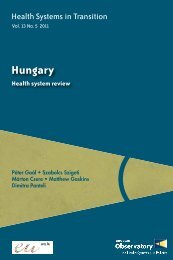Canada - World Health Organization Regional Office for Europe
Canada - World Health Organization Regional Office for Europe
Canada - World Health Organization Regional Office for Europe
You also want an ePaper? Increase the reach of your titles
YUMPU automatically turns print PDFs into web optimized ePapers that Google loves.
<strong>Health</strong> systems in transition <strong>Canada</strong> 9<br />
the central government. Some provincial governments (e.g. Alberta) have<br />
occasionally demanded less federal conditionality and greater flexibility in<br />
terms of the <strong>Canada</strong> <strong>Health</strong> Act.<br />
Unlike the provinces and territories, local or municipal governments are<br />
not constitutionally recognized. Instead, they are political units created under<br />
provincial government law. Municipal and county governments are delegated<br />
authority and responsibility by the provinces <strong>for</strong> the delivery of local public<br />
services and infrastructure. Historically, local governments played a role, albeit<br />
modest, in the administration and delivery of health services. However, the<br />
Saskatchewan model of single-payer hospital and medical care services with<br />
a centralized payment system administered by provincial governments was<br />
eventually adopted by other provinces and territories (Taylor, 1987; Tuohy 2009).<br />
Elections take place on average every four years <strong>for</strong> the federal House of<br />
Commons as well as <strong>for</strong> provincial and territorial legislatures under a “first-pastthe-post”<br />
electoral system 3 based on F/P/T constituencies. Political competition<br />
occurs largely with the context of competitive and adversarial political parties. 4<br />
Except <strong>for</strong> the social democratic New Democratic Party (NDP), provincial<br />
parties are organizationally separate from political parties at the federal level.<br />
The Prime Minister is the leader of the majority party in the House of Commons<br />
and appoints the cabinet of ministers from among the elected members, a system<br />
that is replicated in the provinces and one territory – Yukon. Currently, there are<br />
four national political parties that attempt to run candidates in all constituencies<br />
in <strong>Canada</strong>: the Conservative Party of <strong>Canada</strong>, the NDP, the Liberal Party of<br />
<strong>Canada</strong> and the Green Party of <strong>Canada</strong>. There is also a regional party – the Bloc<br />
Québécois – but its influence was severely diminished after the 2011 federal<br />
election. Established in the early 1990s to advance Quebec’s independence<br />
from the Canadian federation, the Bloc regularly defends what it defines as<br />
Quebec’s interests in the Parliament of <strong>Canada</strong>, and supports a progressive<br />
decentralization of power and authority from the central government to the<br />
provinces. In the federal election of 2006, the Conservative Party of <strong>Canada</strong><br />
under leader Stephen Harper defeated a Liberal Government that had been in<br />
power since 1993. The Harper Conservatives were defeated on a motion of<br />
non-confidence but won a second minority government in 2008 and a majority<br />
government in 2011 (Table 1.6).<br />
3 Each voter selects one candidate. All votes are counted and the candidate with the most votes in a defined<br />
geographical constituency is the winner irrespective of the votes garnered by the candidate’s political party on<br />
a national, provincial or territorial basis.<br />
4 There are two exceptions to this rule: the territorial governments in Nunavut and the Northwest Territories are<br />
<strong>for</strong>med by individual members elected without party affiliations, and cabinet membership is decided by the votes<br />
of the members of the legislative assemblies.
















